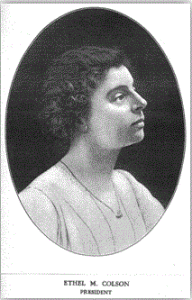 Her lively wit, wide sympathies and quick banter made Ethel Colson a popular lecturer and earned her numerous friends in the many social clubs of her era. She had the ability to identify with her audiences and that appeal was present throughout her writings, lectures and leadership. She understood the problems women faced and taught to bridge those concerns in a male dominant profession with her journalism students in the early 1900s.
Her lively wit, wide sympathies and quick banter made Ethel Colson a popular lecturer and earned her numerous friends in the many social clubs of her era. She had the ability to identify with her audiences and that appeal was present throughout her writings, lectures and leadership. She understood the problems women faced and taught to bridge those concerns in a male dominant profession with her journalism students in the early 1900s.
Ethel Colson was born in Ashby de la Zouch, Leicestershire, England, in 1870. Her parents, Arthur and Clemintina (Walker) Colson brought her to America when she was three years of age. The family settled in Geneva, Wisconsin, where she and her five siblings were educated by special tutors in their youth. Ethel’s university studies specialized in literature and music and led to an early career as a teacher of music and voice.
Ethel joined the Illinois Woman’s Press Association in 1890 as an author, poet and literary contributor to a wide field of genres which included fiction and poetry. She was a literary editor for the Chicago Herald; editor of Chicago Girl; a lyricist, publicist, lecturer, script writer for radio, book reviewer and wrote for magazines. Saving a Boy, an early fiction story she penned, was published in the October 1902 issue of Harper’s Bazaar. As a lyricist, she is credited for the words to songs including the 1896 “The Dance We Sat Out on the Stair” with music by Harry Castleton Wade.
Mostly published in the United States, her fiction and special articles also appeared in European periodicals. Ethel did freelance work for the Chicago Tribune, the Chicago Times-Herald and the Chicago Daily News. She was a book author and her titles included How to Read Poetry, How to Write Poetry and Writing and Editing for Women.
As the eleventh president of the Illinois Woman’s Press Association, Ethel’s popularity during her first term led to her re-election for a second term at the association’s general meeting on June 12, 1914, at the Hotel LaSalle, Chicago. IWPA celebrated Ethel as its president from 1913 to 1917 and honored her as both a Fifty-Year Member and Life Member during her lifetime. Her many social contacts were made in the variety of organizations of which she was a member. Some of them were the Episcopal church (Associate Sisters of St. Mary, Kenosha, Wis.); the Morgan Park Woman’s Club; the Chicago Woman’s Club; the Woman’s City Club of Chicago; the Cordon, Chicago; the Society of Midland Authors; the Poetry Society of America and the Allied Arts Association.
Politically non-partisan, she maintained an interest in all important political questions and affairs of the time. As a speaker, she specialized in yearly lectures, literary talks and current event classes. Some of her standard subjects were, “Poetry as an Interpreter of Life” and “American Drama of Today.”
Ethel left the Chicago Tribune to lecture on departmental work in journalism for women at the Medill School of Journalism, at Northwestern University and on current events of the day at Teachers College, Chicago. Steadfast in her belief in a woman’s need of college training and a professional skillset, she suggested to her female students there was a future for them in new fields which in the 1920s included motion picture criticism, trade papers, commercial publicity and advertising. She offered that “the fact of sex, the ‘woman’s angle’ is the woman writer’s tool, but must never be her weapon.” She emphasized the difficulty to obtain exact statistics on the number of women in journalism at the time “because of the amazing rapidity with which young women slip in and out of such jobs” and estimated the number between 20,000 and 25,000. She noted women were often paid “one-third less than men doing the same work” and cited many reasons in defense of this discrimination, including “continual turn-over due to feminine restlessness.”
On June 24, 1919, at the age of 39, Ethel married newspaper editor, Frank Brazelton. During their marriage the couple resided in the city’s Hyde Park neighborhood. After a fifty year career as a Chicago newspaperman, Frank retired in 1929 from his role as the feature editor of the Chicago Journal. He passed away in May of 1936.
Age did not slow Ethel down. Between 1936 and the early 1940s, she was still active with her lecture circuit, opening study classes for current events and leading book reviews at women’s clubs throughout Chicago. Her professional calendar was filled with appearances which included presentations for the South Side Catholic Women’s Club, the Hyde Park Travel Club, the South Shore Country Club, North Shore Study Club, the Nineteenth Century Club, College Club and the Martha Washington Club among others. On occasion she was a guest speaker for radio programs broadcast on WGN to discuss the connection between current events and books popular at the time. Always an optimist, in 1937 during a discussion she titled, “Magic Windows – Books,” she remarked, “We are climbing so fast we are falling over our own toes…”
Ethel passed away in August, 1946, after several months of illness at the home of her sister in Unionville, Iowa. She and her husband are buried in Forest Park, Illinois.




Leave A Comment